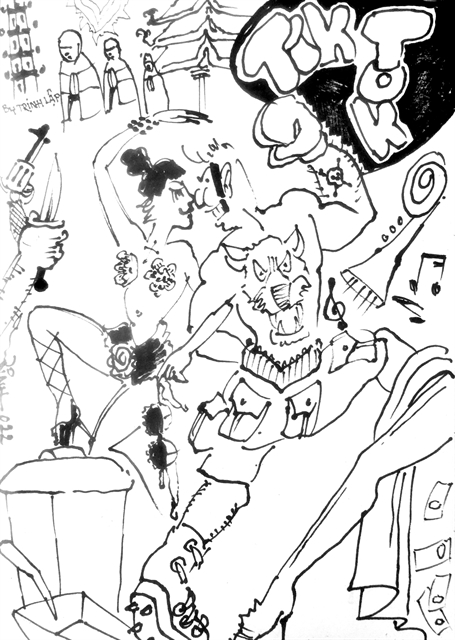 Talk Around Town
Talk Around Town

By Bảo Ngọc
Every TikTok content creator has the same goal: they want their videos to go viral. And some seem willing to do whatever it takes to make that happen.
But “whatever it takes” is not always the right notion to have.
Even though many videos that go viral on TikTok are entertaining and earn their makers money, others raise moral concerns.
Earlier this month, a virtual boycott was initiated after N.O.N., a TikToker, posted a video of himself providing a free meal to a poor elderly woman.
The terrified expression on the old woman's face, his sardonic tone when giving food to charity, and the ice-cold apologies all added to the widespread hatred he received online. This is not the first time Vietnamese TikTok creators have been criticised for making offensive videos to grow their followers.
TikToker N.H.M, 23, came under fire in August for creating a video that included offensive comments about people in Central Việt Nam.
The video's controversial content led to millions of views, thousands of comments, and hundreds of thousands of shares. Many were outraged because they sensed racism and regional discrimination in the video.
Not long after that, 26-year-old L.M.X.Y. received criticism after posting a video of herself posing for photos on an airport runway. Even though the footage was taken down, Y was mocked for putting her and other passengers' lives in danger for the sake of a dumb TikTok video.
 |
| Illustration by Trịnh Lập |
Since its global launch in 2016, TikTok has become one of the largest video-sharing platforms in the world, operating in over 150 countries. The app allows users to edit short clips easily and generate trends on social networks. In Việt Nam, TikTok ranks as the most popular short video-sharing application, despite fierce competition from Instagram Reels and YouTube.
According to a recent UK-based clothing brand Superdry study, which analysed #travel and related hashtags on TikTok videos, Việt Nam is the sixth most watched country on the platform, with 107 million views. Many viral hits have originated on TikTok, and many prominent musicians are now using the platform.
However, the app is largely to blame for the unprecedented popularity of numerous songs with obscene lyrics. The millions of videos uploaded daily to TikTok mean that users must constantly come up with different and often shocking material if they want to be seen and trend.
And this is why, despite the warnings of numerous experts about the negative impact such platforms have on young people, deadly challenges and inappropriate content are still uploaded constantly.
So, can harmful videos be blocked using some kind of management system?
In short, yes. HCM City's Department of Information and Communications handed N.O.N. a VNĐ7.5 million fine for using offensive language during charity work amid a public backlash.
TikTok also announced it had banned the user's account indefinitely and may prevent him from making new accounts from the same device.
On August 22, the Cyber Security and High-Tech Crime Prevention and Control Department of the Lâm Đồng Provincial Police announced that they had decided to fine N.H.M. VNĐ10 million for his part in causing public outrage with the offensive video clip that insulted people speaking Vietnamese with a Central region accent.
The Civil Aviation Administration of Việt Nam announced in August that they had banned L.M.X.Y., the female TikToker who posed for photos on the airport runway, from flying for six months.
The authorities are doing a fantastic job of monitoring and penalising content creators who overstep boundaries or break the law. But is that enough to prevent the toxic material?
I don't think so.
Like any other social media platform, TikTok is home to both inspiring and disturbing content made by its users. Therefore, users should be selective before sharing or interacting with any video. We must strongly criticise videos containing harmful and inappropriate content and their creators.
Hopefully, the platform will soon revert to its original mission of "making every second count." VNS